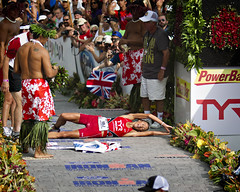It's rare for me to dedicate an entire blog post to someone else's words entirely but this is honestly one of the BEST articles that I've ever read. Today is the last day of US Nationals which is technically NOT Olympic trials but it is certainly the last chance in the qualification period to "show your stuff." North of the border our Canadian friends are having official Olympic trials in Canmore. Personally I am lucky enough to have already made the objective criteria for the Sochi team but there are still other battles to fight & goals to aspire too. In the next day, week and month some dreams will be realized while others may fall short of expectation.
A photo I took during the 2010 Vancouver Closing Ceremonies
In the article below Chrissie Wellington (World IronWOMEN Champion) talks about goals, disappoint & rebounding from tough situations. I've copied and pasted her article below but if you'd like to read the article in full on her site check out the link which will take you to her page:
I highly recommend this article to anyone and everyone - even if you're having the season of your life and performing beyond your greatest dreams. Please pass it along to anyone you think might be interested. And thank you Chrissie for your amazing words of wisdom. Without further ado.....
"Turning Turds into Triumphs"
10/7/12
As the Olympics draws ever closer many professional triathletes have realised their often lifelong dream of getting to the Games; managing to secure a place on their national team and participate in what will be the biggest sporting spectacle the world has ever seen. Their qualification is the result of years of dedication, hard work and perseverance. But for every athlete that has achieved their holy grail there will be others who did not qualified, who have to cope with the intense disappointment, frustration and even anger of having the Olympic ringed rug pulled from under them. Of course, it is not only professional athletes that have to deal with disappointment, especially sessions or races that have, in our minds, been total – for want of a better word – turds. Yes, s*it happens.
I remember my first race in 2006: the Redditch Super Sprint. My borrowed wetsuit turned out to be too big, the non-so tropical waters flooded in. I couldn’t swim and had to be rescued by a kayaker. Game over. Not super, but - having lasted all of about 10 seconds – it was very sprint like. And in 2009 I raced the Columbia Triathlon. I failed to perform and finished a disappointing (for me) 6thplace. At times like these we can throw our triathlon toys out of the pram, stamp our orthotic assisted feet, and let the flames of disappointment destroy us, or we can emulate a Phoenix – that mythological bird which rises from the inferno, emerging stronger and much more powerful.
Coping with a bad session, a suboptimal race, a DNS, a DNF, injury or failure to qualify for the Olympics is about as easy as the vertical climb up Alpe D’Huez. It’s hard work. You have no doubt invested time, energy, money and emotion in your performance. The feeling of ‘loss’ if you fail to live up to your expectations can be massive. But Sir Steve Redgrave didn’t always travel along a path paved with roses. He overcame illness, disappointment and self-doubt to win his five Olympic gold medals. Indeed, one might say it was precisely because he endured those turd-like troughs that he could rise to the peaks of global greatness. So how do we deal with the post race blues, and rise like a phoenix from the flames?
1) Cry, stamp you feet, rant, rave and through your heart rate monitor out of the pram. It feels good. And then stop. Remember that the feelings of disappointment, despair or frustration are temporary, and they are under your control. You can either choose to wallow, and hence prolong the agony, or else make that conscious effort to replace them with ‘cup half full’ feelings. Smile, laugh. It’s easier than frowning.
2) Get over the A-type personality’s unwillingness to admit ‘failure’ as weakness and talk to, and lean on, friends, family, teammates, a coach, or Jeremy Kyle. They will provide a shoulder, an objective assessment and opinion, and/or give you a sharp kick up the posterior, tell you to kindly zip up your (tri)suit and encourage you to (slowly) move on.
3) To plunder the words of the Japanese poet, Masahide: “The barn has burned to the ground. Now I can see the moon”. Having set alight to the barn, the ‘failure’ gives you the clarity you need to look at the lunar landscape, so take time to really learn the lessons: have a look at your training log, did you not get the right amount of rest and recovery?did you have one to many kebabs in the lead up? did you have a tough few weeks at work or an argument with loved one that preoccupied your mind? did your equipment choices bite you on the backside (or was your backside looser than you would have wanted it to be as a result of some nutritional faux pas)? did you let pre race nerves strangle you? Work out what of these, if any, were under your control and what were not. Then focus on the controllables, make a note of them and use training to minimise the risk of history repeating itself. If you get nervous, develop a strategy for controlling your fears. Were you stranded and unable to change your flat tyre? Get someone to teach you the skills of the rubber change. Did you get a cramp on the run? Look at your muscle conditioning, or your hydration/nutrition. Get help from trusted sources, including a coach, to work on your weaknesses, whether it be in training, nutrition, strength work, or training the brain.
(my dog eared copy of Rudyard Kipling’s If)
4) Focus on the positives. No, you may not have won the jackpot of five million pounds. But you did win ten thousand, and that’s nothing to be sneezed at. You may not have had the overall performance you wanted, but you may have had a great swim, or a superb run, or you might have finally managed to learn how to pee on the bike without having to duck into a bush. With every shocker there has to be some element of success, you might just have to dig beneath that melancholy mud a little to find it. Write those positives down, and focus on them. Cup half full.
5) Read about athletes who have overcome adversity. If they can do it, so can you. Even JK Rowling admitted she reached rockbottom, before Harry pottered along.
6) Recall the ‘good races’ when hunky and dory came together. Having a clunker of a race makes you appreciate the good times even more. Look at your previous winners medals, watch old races videos, remember the promotion you got at work… Feet stamping disappointment about my DNS in Kona 2010 definitely made me appreciate the races where I had achieved my goals, and just how much being World Champion meant to me.
7) Fire up the mojo by giving yourself a new, realistic yet ambitious goal, and set about working towards it. Split that journey towards the goal into smaller manageable steps, so you can celebrate success – and ensure the inevitable bad day – along the way.
A wise Buddha once said that “the arrow that hits the bull’s-eye is the result of 100 misses”. So next time you have a bad race, wallow, cry, stomp, learn and bank the lessons and then try to move on. Yes, the race result is important. You have invested a huge amount of time and energy in achieving your goal – as have those around you – but ultimately it is about the journey to that start line, enjoying each and every moment and never letting that race day performance – good or bad – totally define you.
I have plundered these famous words before, but it never hurts to regurgitate the great Muhammad Ali “Success is not achieved by winning all the time. Real success comes when we rise after we fall. Some mountains are higher than others. Some roads steeper than the next. There are hardships and setbacks but you cannot let them stop you. Even on the steepest road you must not turn back”.
If you manage to retain the Phoenix philosophy then I know the next time you toe the line you will be able to climb those vertical Alpe D’Huez switchbacks, hit that bull straight in the eye and turn a turd into a triumph.
Onwards and upwards!


